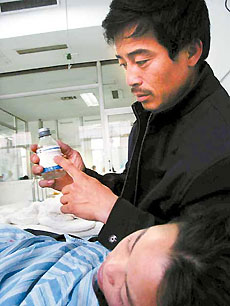BEIJING - China has banned a domestically produced antibiotic after a child
died from being treated with it and other patients suffered effects ranging from
diarrhea to anaphylactic shock, the government said Friday.
 |
|
| The father of a
patient holds a bottle of clindamycin phosphate glucose at the No 2
Hospital Affiliated to Harbin Medical University on Thursday night.
[Xinhua] |
|
A 6-year-old girl from Harbin, the capital of northeastern China's
Heilongjiang province, died July 24 after being injected with the drug produced
by a company in the eastern Anhui province, the official Xinhua News Agency
said.
The ban applied to all batches of the drug clindamycin phosphate glucose ¡ª
used to treat bacterial infections, produced in the past two months by Huayuan
Worldbest Biology Pharmacy Co., a notice posted on the Ministry of Health's Web
site said.
The ministry notice did not mention whether the drug had caused any deaths or
say how many people were sickened. A press officer with the ministry who would
only give his surname, Ma, said no other details could be provided as
authorities were still investigating the case.
Xinhua cited the director of Harbin's drug-monitoring center as saying the
girl developed a high fever 20 minutes after the injection, and slipped into a
coma shortly after.
"Based on all materials we have gathered, a preliminary judgment can be made
that the girl was killed due to the injection of the clindamycin phosphate
glucose produced by Anhui's Huayuan Worldbest Biology Pharmacy Co.," Sun Pengli,
the director, was quoted as saying.
A man working in the production department of Huayuan who refused to give his
name said the company notified authorities and recalled the product after
discovering the problem a couple of weeks ago. He did not give specific dates.
Production of the drug was immediately stopped, and an internal investigation
is ongoing, he said.
The health ministry said that some patients also reported kidney pains,
stomach aches, nausea, vomiting and chest pains after using the drug.
China's pharmaceutical industry is highly lucrative but spottily regulated,
enticing some to try to cash in by substituting fake or substandard ingredients.
In a separate case earlier this year, 11 people were killed after injecting a
drug made by the Qiqihar No. 2 Pharmaceutical Co. Ltd. in the northeastern
province of Heilongjiang.
An investigation showed that the drug, called Armillarisni A, contained a
chemical, diglycol, that can cause kidney failure, which a vendor had passed off
as a normal ingredient.